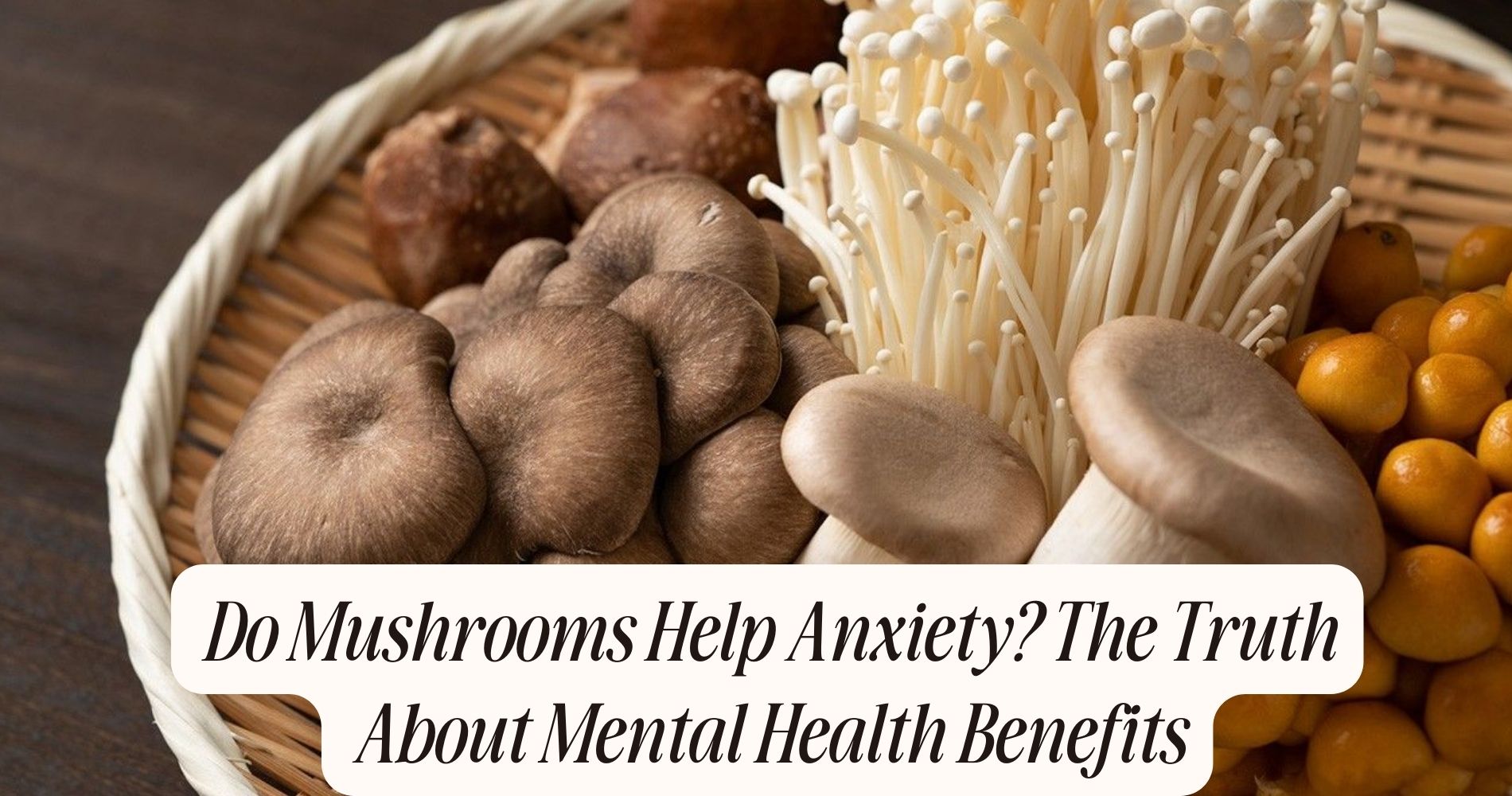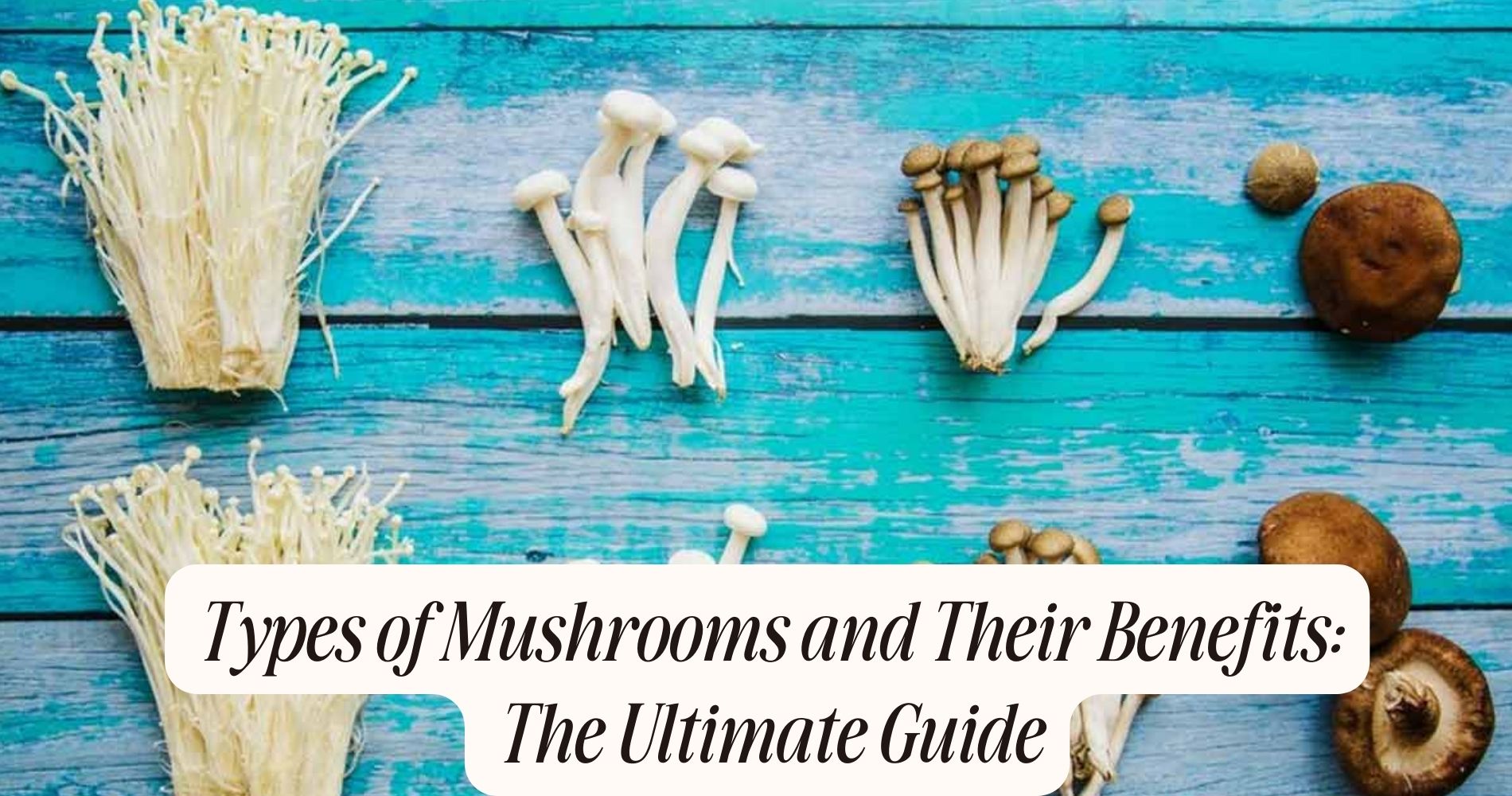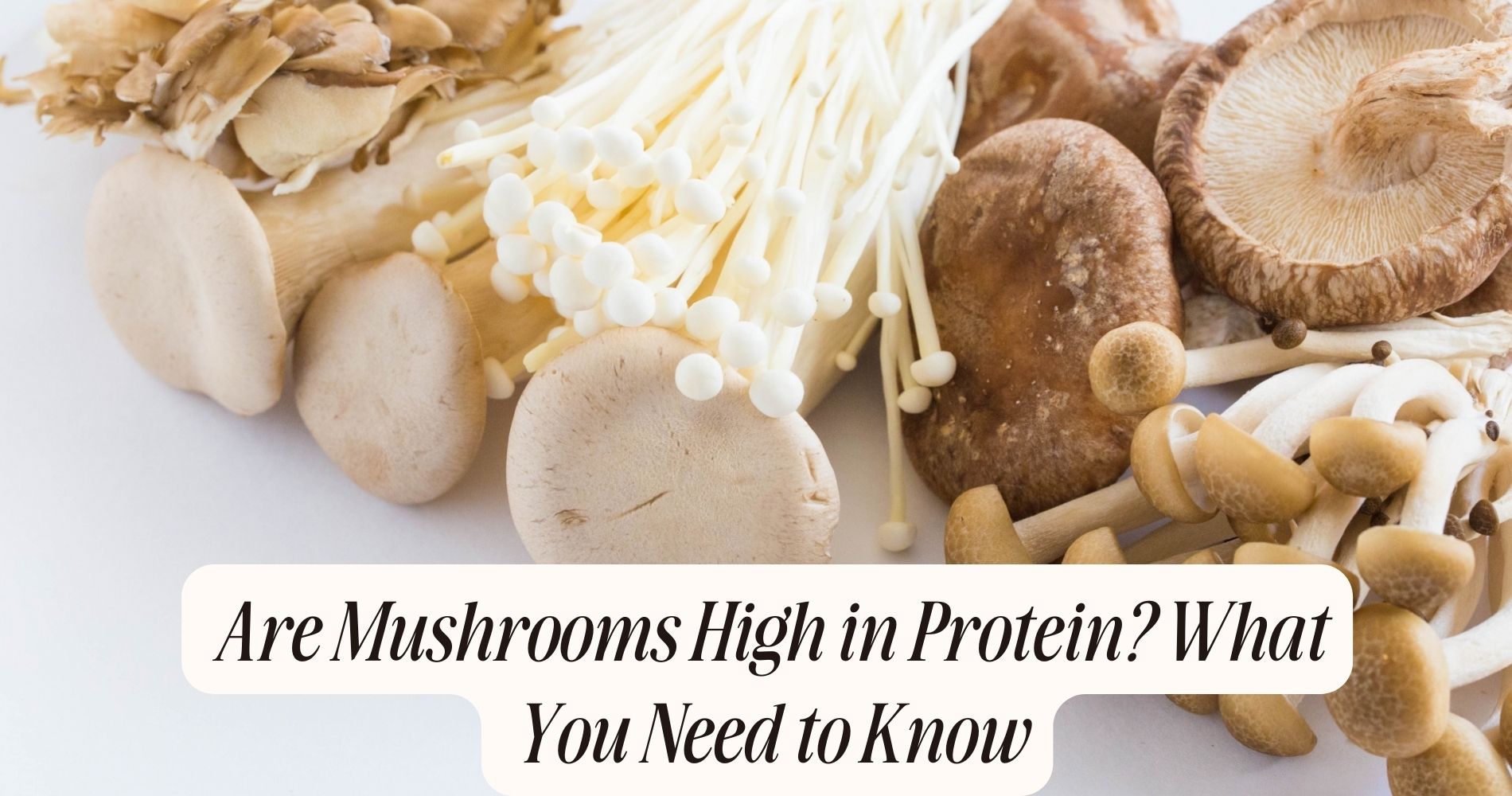
Do Mushrooms Help Anxiety? The Truth About Mental Health Benefits
Do mushrooms help anxiety? Certain mushroom varieties may help with anxiety. Compounds like psilocybin interact with serotonin receptors, potentially easing anxiety symptoms by influencing mood and perception. Research shows significant reductions in anxiety in controlled trials. Lions' Mane and Reishi are noted for cognitive and stress benefits. However, risks include toxicity from misidentification and unspecified dosages. Always consult your healthcare provider for guidance. Uncover more about mushrooms' potential mental health benefits as you explore further.
Understanding the Role of Mushrooms in Nutrition
Mushrooms, often celebrated for their unique flavors, have an important role in nutrition due to their rich nutrient profile.
You mightn't realize it, but mushrooms are a powerhouse of essential nutrients. They're low in calories and fat, yet high in fiber, making them a great choice for a balanced diet.

Rich in vitamins like B-complex and D, mushrooms support energy metabolism and bone health. They also contain antioxidants such as selenium, which help combat oxidative stress.
Studies suggest that the health benefits of mushrooms extend to heart health, due to their ability to lower cholesterol levels.
Exploring the Psychedelic Properties of Certain Mushrooms
While mushrooms have long been valued for their nutritional benefits, certain species possess unique psychedelic properties that have intrigued researchers and enthusiasts alike. Psilocybin mushrooms are the most well-known, offering psychedelic experiences that alter perception, mood, and cognition.
These experiences aren't just recreational; they hold potential therapeutic applications. Studies indicate that psilocybin can alleviate symptoms of depression, PTSD, and other mental health disorders.

You'll find that the therapeutic potential stems from how these compounds interact with serotonin receptors in the brain, promoting neuroplasticity and emotional release.
However, it's crucial to approach these findings cautiously. Clinical applications require controlled settings and professional guidance.
As research progresses, the understanding of how psychedelics contribute to mental health continues to evolve.
The Science Behind Mushrooms and Anxiety Relief
Though the use of mushrooms for anxiety relief might sound unconventional, scientific research increasingly supports their potential efficacy. Recent anxiety research highlights that certain mushroom compounds, such as psilocybin, interact with serotonin receptors in the brain. This interaction can lead to altered perception and mood, potentially easing anxiety symptoms.
Studies, including double-blind, placebo-controlled trials, demonstrate promising results, showing significant reductions in anxiety levels among participants. Additionally, these trials suggest that mushrooms could offer a safer alternative to traditional pharmaceuticals, with fewer side effects.
Researchers methodically analyze how these compounds impact neural pathways, providing a clearer understanding of their mechanisms. While more studies are needed to solidify these findings, the current evidence underscores the potential role of mushroom compounds in anxiety management.
Popular Mushroom Varieties Linked to Mental Health
As the exploration of mushrooms and mental health deepens, specific varieties have emerged as potentially beneficial for managing anxiety and other mental health conditions.
Lion's Mane is noted for its neuroprotective properties, which may support cognitive health and alleviate anxiety symptoms.
Reishi benefits include stress reduction and immune system support, making it a popular choice for promoting mental well-being.
Shiitake varieties are rich in nutrients, potentially aiding mood regulation and providing overall health benefits.

Cordyceps effects on energy levels and endurance could indirectly support mental health by reducing fatigue-related stress.
These findings are based on preliminary research and require further investigation to confirm efficacy and safety.
However, the potential of these mushrooms is drawing attention in the domain of mental wellness.
Potential Risks and Considerations
Despite the promising potential of mushrooms like Lion's Mane and Reishi for mental health, it's vital to take into account their potential risks and challenges.
Mushroom toxicity is a significant consideration. Not all mushrooms are safe; some can cause harmful effects if misidentified or improperly prepared. Consequently, you should guarantee you're sourcing them from reputable suppliers.
Additionally, dosage concerns play a considerable role. The appropriate dosage for mental health benefits isn't well-defined, leading to possible underdosing or overdosing. Research suggests that even beneficial varieties can cause side effects if consumed in excess.
It's important to approach mushroom use with caution, consulting healthcare providers for guidance tailored to your unique health profile, and staying informed on emerging studies for safety and efficacy.
Incorporating Mushrooms Into Your Lifestyle
Incorporating mushrooms into your lifestyle can be a practical and beneficial strategy for enhancing mental well-being. Scientific studies suggest that certain mushrooms may support anxiety reduction, making them a valuable addition to your routine.
You can start by exploring mushroom recipes, integrating varieties like lion's mane and reishi, known for their potential calming properties. Cooking with these mushrooms not only diversifies your diet but also introduces you to their health benefits.

Additionally, consider daily supplements as a convenient option. These supplements often contain concentrated extracts, guaranteeing you receive beneficial compounds consistently.
However, it's essential to consult with a healthcare provider to determine the appropriate dosage and verify they don't interact with other medications you're taking. Adopting these methods may bolster your mental health journey.
Stay Calm & Focused with SUPER MUSHROOM GUMMIES
Managing stress and anxiety naturally is easier with Well Gummies' SUPER MUSHROOM GUMMIES. Packed with 10 functional mushrooms, including Reishi and Lion’s Mane, these delicious wild berry-flavored gummies help promote relaxation, improve focus, and support a balanced mood. No jitters, no crash—just calmer energy and sharper mental clarity to keep you feeling your best. Convenient and easy to take, they’re the perfect way to fuel your mind and body daily. Try them today and experience the benefits firsthand!
Frequently Asked Questions
Can Mushrooms Interact With Prescription Medications for Anxiety?
You're wondering if mushroom interactions affect medication safety for anxiety. Yes, certain mushrooms can interact with prescription medications. It's essential to consult your healthcare provider to guarantee your treatment plan remains safe and effective.
Are There Any Cultural Traditions Using Mushrooms for Mental Health?
You'll find that many cultures have used mushrooms in shamanic rituals and traditional medicine for mental health. These practices often emphasize spiritual healing, but scientific evidence on their effectiveness for anxiety specifically remains limited and requires further research.
How Do Mushrooms Compare to Other Natural Remedies for Anxiety?
You should compare mushroom varieties with other natural alternatives by analyzing their chemical compositions and reported effects. Evidence suggests some mushrooms might reduce anxiety, but methodical studies are necessary to confirm their efficacy compared to traditional remedies.
Is There a Recommended Dosage for Consuming Mushrooms for Anxiety Relief?
You should follow microdosing guidelines for anxiety relief, typically 0.1 to 0.3 grams. Dosage effectiveness varies, so start small and adjust gradually. Consult scientific studies and professionals to guarantee safety and optimize potential benefits.
Can Children and Pregnant Women Safely Consume Mushrooms for Anxiety Benefits?
When considering mushroom safety for children's health and pregnant women, consult healthcare professionals. Current evidence on safety is limited, making expert guidance crucial. Prioritize individualized advice to guarantee safe consumption and avoid potential risks.
Conclusion
Incorporating mushrooms into your lifestyle could offer mental health benefits, but it's important to approach this methodically. While certain mushrooms, particularly those with psychedelic properties, show promise in reducing anxiety, the science is still evolving. Be aware of potential risks and guarantee you're informed about the specific types you're using. Consult with healthcare professionals before making changes to your routine. As research progresses, mushrooms might become a valuable tool in managing anxiety, but proceed with caution and knowledge.




